This event now concluded. Report available here.
- Date: Thursday, December 10, 2015, 2:00-5:30 pm
- Venue: Iwasaki Koyata Memorial Hall, International House of Japan

- Organizers: International House of Japan,
Maureen & Mike Mansfield Foundation - Sponsored by Japan Foundation, MRA Foundation, Tokyo Club
- Supported by Asahi Shimbun
- Language: Japanese and English (with simultaneous interpretation)
- Admission: 1,000 yen (Students: 500 yen, IHJ Members: free)
Though the United States continues to be the most important partner of Japan, the depth and complexity of its political tradition are not well understood by the Japanese general public. This symposium is intended to explore the significance of America in the contemporary world and explicate the ideals and issues that have characterized the United States of America as a vital force in the world by hearing from experts on the United States and on Japan-U.S. relations.
【Speakers】
Rogers M. Smith (Professor of Political Science, University of Pennsylvania)
Funabashi Yoichi (Chairman, Rebuild Japan Initiative Foundation)
【Panelists】
Furuya Jun (Professor of American Politics and History, Hokkai School of Commerce)
Machidori Satoshi (Professor of Political Science, Graduate School of Law, Kyoto University)
【Moderator】
Agawa Naoyuki (Professor, Faculty of Policy Management, Keio University)
Report
In the second symposium, experts discussed the ideals and issues that have characterized the United States. The symposium started with addresses of 40 minutes each from the two keynote speakers. These were followed by 30 minutes of comments from the two panelists and moderator and a period of discussion among all five speakers. The following is a summary of the two keynote speakers’ addresses.
Keynote Speech 1
In keynote speech 1, University of Pennsylvania professor Dr. Rogers M. Smith explained that the key to understanding the United States today is knowing its faults and weaknesses. Although the ethnic consciousness of the American people has gradually waned since the colonial period, Smith explained, it remains intact.
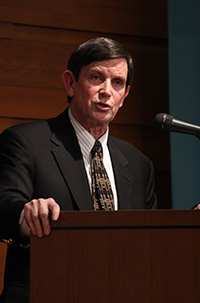 The first generations of Americans wove their story with religious and racial undertones, telling themselves that “the United States and its Christian, European-descended citizens were destined by God, nature and history to become the greatest nation and people in the world.” The story, which Smith calls a “story of peoplehood,” formed a spiritual pillar for the American people—one that would eventually help the United States develop into the world’s wealthiest and strongest nation by the middle of the twentieth century.
The first generations of Americans wove their story with religious and racial undertones, telling themselves that “the United States and its Christian, European-descended citizens were destined by God, nature and history to become the greatest nation and people in the world.” The story, which Smith calls a “story of peoplehood,” formed a spiritual pillar for the American people—one that would eventually help the United States develop into the world’s wealthiest and strongest nation by the middle of the twentieth century.
While recognizing the achievements that the country has made, Smith sees the American people’s “strong tendency to believe that America is always right, and that America’s interests always represent the best interests of the whole world”—a mindset that has taken root over the course of the nation’s history—as a “pathological disorder.” That deep-seated, traditional belief, Smith argues, has hampered the United States’ efforts to play a constructive role in the twenty-first-century context, created rifts in domestic politics as growing numbers of immigrants deepen America’s religious, ethnic, and philosophical diversity, and held the country back from further development.
Keynote Speech 2
The next speaker was Dr. Funabashi Yoichi, former editor-in-chief at the Asahi Shimbun. Speaking from years of experience covering American affairs, Funabashi shared his views on key issues for the United States—particularly its involvement in the Asia-Pacific region, its dependence on the Chinese economy, the threats of the Middle East, and the security of oil-based energy—and underlined the need for a restructuring of Japan-US relations.
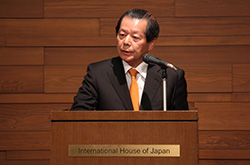 Funabashi expects the United States to scale back its presence in the Asia-Pacific sphere, opting for a “drier,” more selective mode of involvement. Given that the region is the most dynamic area in the world, offers a wealth of business opportunities, and boasts a massive population, Funabashi suggests that establishing a new, rebalanced American position in the region would be in the best interests of both the United States and Japan. To keep their relationship strong, Funabashi says, the United States and Japan will need to work even harder to share and understand each other’s historical and cultural identities. Japanese scholars in the field of American Studies—especially policy specialists—will thus need to elevate their research to the next level, Funabashi argues.
Funabashi expects the United States to scale back its presence in the Asia-Pacific sphere, opting for a “drier,” more selective mode of involvement. Given that the region is the most dynamic area in the world, offers a wealth of business opportunities, and boasts a massive population, Funabashi suggests that establishing a new, rebalanced American position in the region would be in the best interests of both the United States and Japan. To keep their relationship strong, Funabashi says, the United States and Japan will need to work even harder to share and understand each other’s historical and cultural identities. Japanese scholars in the field of American Studies—especially policy specialists—will thus need to elevate their research to the next level, Funabashi argues.
Panel Discussion
For the panel discussion, Smith and Funabashi joined Dr. Agawa Naoyuki (from Keio University), Dr. Furuya Jun (Hokkai School of Commerce), and Dr. Machidori Satoshi (Kyoto University) to address topics such as Japanese students’ declining interest in the United States, the flexibility that the Japanese government needs in order to adjust to the ever-diversifying American demographic, and other elements of Japan-US relations as the ties between the two countries continue to evolve.
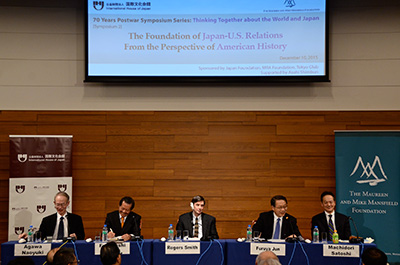
*A short sample video of the symposium will soon be available on the I-House website.
 Professor Smith’s research centers on constitutional law, American political thought, and modern legal and political theory, with special interests in questions of citizenship, race, ethnicity, and gender. He is the author or co-author of many articles and seven books, including Civic Ideals: Conflicting Visions of Citizenship in U.S. History (Yale University Press, 1997), Still a House Divided: Race and Politics in Obama´s America with Desmond S. King (Princeton University Press, 2011), and Political Peoplehood (University of Chicago Press, 2015). Civic Ideals received six best book prizes and was a finalist for the 1998 Pulitzer Prize in History. Prof. Smith was elected a Fellow of the American Academy of Arts and Sciences in 2004 and of the American Academy of Political and Social Science in 2011.
Professor Smith’s research centers on constitutional law, American political thought, and modern legal and political theory, with special interests in questions of citizenship, race, ethnicity, and gender. He is the author or co-author of many articles and seven books, including Civic Ideals: Conflicting Visions of Citizenship in U.S. History (Yale University Press, 1997), Still a House Divided: Race and Politics in Obama´s America with Desmond S. King (Princeton University Press, 2011), and Political Peoplehood (University of Chicago Press, 2015). Civic Ideals received six best book prizes and was a finalist for the 1998 Pulitzer Prize in History. Prof. Smith was elected a Fellow of the American Academy of Arts and Sciences in 2004 and of the American Academy of Political and Social Science in 2011.
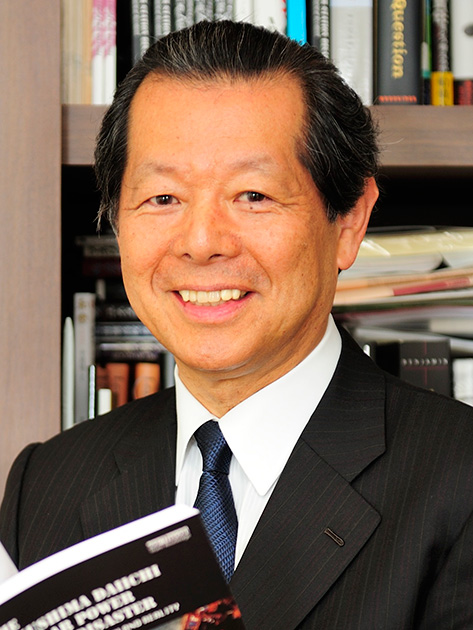 Dr. Funabashi served as correspondent for Asahi Shimbun in Beijing (1980-81) and Washington (1984-87), and as American General Bureau Chief (1993-97). He won the Japan Press Award, known as Japan’s Pulitzer Prize, in 1994 for his columns on foreign policy. His books in English include The Peninsula Question (Brookings Institute, 2007), and Examining Japan’s Lost Decades (Routledge Contemporary Japan Series, 2015). He received his B.A. from the University of Tokyo in 1968 and his Ph.D. from Keio University in 1992. He was a Nieman Fellow at Harvard University (1975-76), a visiting fellow at the Institute for International Economics (1987), a Donald Keene Fellow at Columbia University (2003), and a visiting professor at the University of Tokyo Public Policy Institute (2005-2006).
Dr. Funabashi served as correspondent for Asahi Shimbun in Beijing (1980-81) and Washington (1984-87), and as American General Bureau Chief (1993-97). He won the Japan Press Award, known as Japan’s Pulitzer Prize, in 1994 for his columns on foreign policy. His books in English include The Peninsula Question (Brookings Institute, 2007), and Examining Japan’s Lost Decades (Routledge Contemporary Japan Series, 2015). He received his B.A. from the University of Tokyo in 1968 and his Ph.D. from Keio University in 1992. He was a Nieman Fellow at Harvard University (1975-76), a visiting fellow at the Institute for International Economics (1987), a Donald Keene Fellow at Columbia University (2003), and a visiting professor at the University of Tokyo Public Policy Institute (2005-2006).
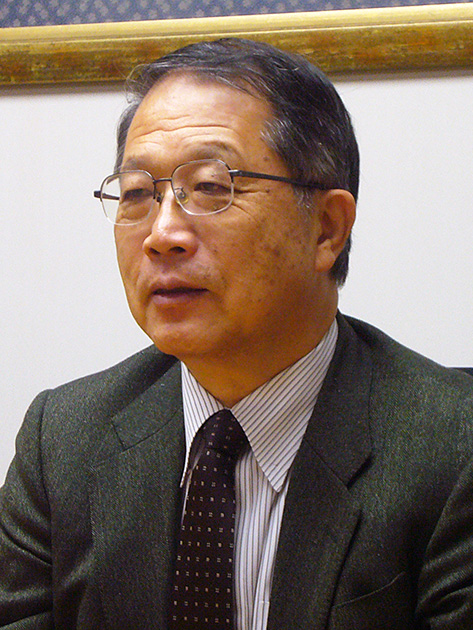 Professor Furuya received his Ph.D. from Princeton University in 1989 with his thesis “Gentlemen’s Disagreement.” His area of expertise is American political history. Before joining the Hokkai School of Commerce in 2012, he taught at Hokkaido University (Faculty of Law) and the University of Tokyo (Graduate School of Arts and Sciences). He also served as Director of the Center for Pacific and American Studies at the University of Tokyo. His publications in Japanese include Americanism: Nationalism and the “Universalist State” (University of Tokyo Press, 2002), America between Past and Present (Iwanami Shoten, 2004), From Bush to Obama (Iwanami Shoten, 2009), and A Political and Diplomatic History of the United States (University of Tokyo Press, 2nd ed. 2012)
Professor Furuya received his Ph.D. from Princeton University in 1989 with his thesis “Gentlemen’s Disagreement.” His area of expertise is American political history. Before joining the Hokkai School of Commerce in 2012, he taught at Hokkaido University (Faculty of Law) and the University of Tokyo (Graduate School of Arts and Sciences). He also served as Director of the Center for Pacific and American Studies at the University of Tokyo. His publications in Japanese include Americanism: Nationalism and the “Universalist State” (University of Tokyo Press, 2002), America between Past and Present (Iwanami Shoten, 2004), From Bush to Obama (Iwanami Shoten, 2009), and A Political and Diplomatic History of the United States (University of Tokyo Press, 2nd ed. 2012)
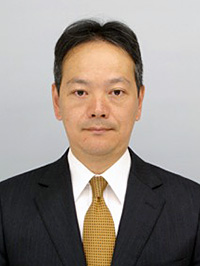 Professor Machidori received his B.A. in Law (LL.B.) and Ph.D. in Law (LL.D.) from Kyoto University and his M.A. in Political Science from the University of Wisconsin-Madison. He specializes in the comparative analysis of legislative institutions and in American politics. Before joining Kyoto University, he taught at Osaka University and was a visiting researcher at the University of Wisconsin-Madison and the University of California. He won the thirty-fourth Suntory Prize for Social Science and Humanities in 2012 for his book in Japanese The Japanese Premiership: An Institutional Analysis of Power Relations (Chikura Shobo, 2012). He has published books in Japanese on comparative politics, including Fiscal Reform Under Democracy (Yuhikaku, 2003) and Japan’s Local Politics (University of Nagoya Press, 2007).
Professor Machidori received his B.A. in Law (LL.B.) and Ph.D. in Law (LL.D.) from Kyoto University and his M.A. in Political Science from the University of Wisconsin-Madison. He specializes in the comparative analysis of legislative institutions and in American politics. Before joining Kyoto University, he taught at Osaka University and was a visiting researcher at the University of Wisconsin-Madison and the University of California. He won the thirty-fourth Suntory Prize for Social Science and Humanities in 2012 for his book in Japanese The Japanese Premiership: An Institutional Analysis of Power Relations (Chikura Shobo, 2012). He has published books in Japanese on comparative politics, including Fiscal Reform Under Democracy (Yuhikaku, 2003) and Japan’s Local Politics (University of Nagoya Press, 2007).
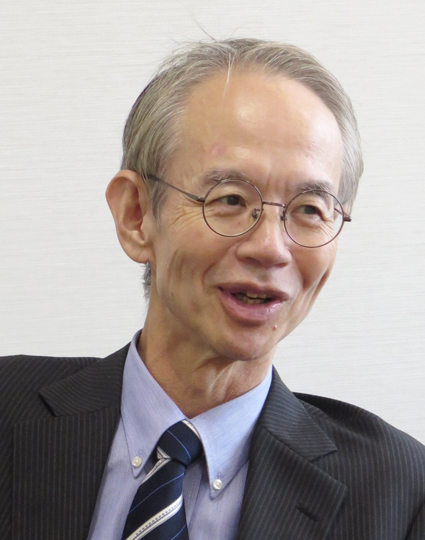 |
| (Photo by Uchida Koichi) |
Professor Agawa is a graduate of the Law School (JD, 1984) of Georgetown University. He joined Keio University in 1999, where he currently teaches American constitutional law and history as well as the history of Japan-U.S. relations as a Professor; he served as Vice President between 2009 and 2013 and Dean of the Faculty of Policy Management at Keio between 2007 and 2009. Prof. Agawa served as Minister for Public Affairs at the Embassy of Japan in Washington, D.C. (2002–2005). He has also worked at law offices both in the U.S. and Japan and was a member of the Legal Department of Sony Corporation (1977–1987); he is licensed to practice law in the State of New York and the District of Columbia.